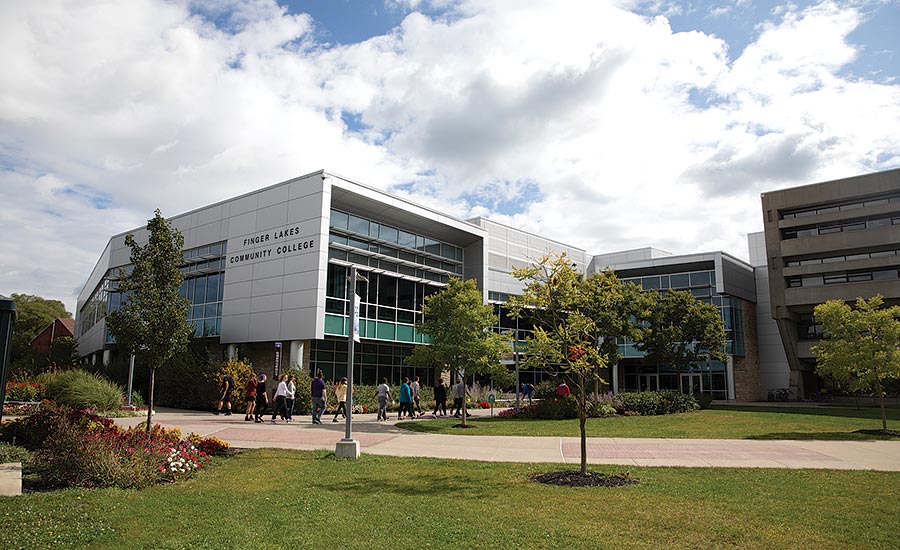
The Micro CHP XRGI 25 (pictured above) uses natural gas to simultaneously create heat for hot water and electricity that can be used on campus. Photo courtesy of Lochinvar.
Cogeneration puts New York college on the leading edge of sustainability
The project has saved the school more than $17,000 in annual electricity costs.
Finger Lakes Community College (FLCC) has served upstate New York for more than 50 years. Annual enrollment is about 6,000 — and normally, most students attend classes at the 250-acre main campus in Canandaigua, New York. FLCC Forward, the school’s strategic plan through 2023, emphasizes FLCC’s commitment to “pursue innovations and partnerships that show the greatest promise for building a culture of sustainability and continuous improvement that mirror our values of inquiry, perseverance and interconnectedness.”
The challenge
The Lochinvar boilers installed more than 25 years ago on the FLCC main campus delivered state-of-the-art high efficiency in their day, but the college needed to upgrade in order to meet FLCC Forward’s ambitious energy-reduction goals.
Catherine Ahern, FLCC’s director of facilities and grounds, met with Bill Coe, director of project development for EMCOR Services — Betlem, and Lochinvar sales representative WMS Sales to begin a New York State Energy Research and Development Authority study to identify capital projects to improve the college’s energy efficiency. When the study was completed, Ahern and Coe began exploring options for replacing the domestic hot water system.
The solution
After a visit to Lochinvar, Ahern and Coe decided to integrate the company’s Micro CHP XRGI 25 cogeneration system into the capital project in order to increase savings further by connecting the school’s domestic hot water system to its space-heating hot water loop. Adding the cogeneration system would allow FLCC to generate electricity on-site, Ahearn explains.
FLCC received a $17,000 design/build incentive from New York State Energy & Gas, the first incentive ever given for a cogeneration project in the utility’s history. The college removed its two old boilers and replaced them with two Lochinvar KNIGHT 399,000 Btu/h high-efficiency boilers and two hot water storage tanks. The Micro CHP system was then piped in, prioritizing domestic hot water while also supplying space heating for nearly 500,000 square feet of campus buildings.

The Micro CHP system uses natural gas to simultaneously create heat for hot water and electricity that can be used on the campus. This capability is particularly important in regions of the country where there’s a wide “spark spread” — the difference between the low cost of natural gas and the high cost of local electricity. By relying on the high-efficiency KNIGHT boilers during periods of peak demand, the system provides all the hot water required at the school. Simultaneously, it generates electricity to reduce grid dependence and lower electrical costs using the same fuel used to produce hot water.
The results
“The Micro CHP cogeneration project demonstrates FLCC’s commitment to the sustainability and energy-saving goals that are central to our FLCC Forward strategy,” Ahern says. “We have already seen a tremendous amount of cost-savings from the system, but most importantly, incredible numbers in carbon reduction. Our students and staff are so proud of the way the systems are performing and propelling our campus towards a more sustainable future.”
Coe says: “Adding the Micro CHP system along with the KNIGHT boilers helps FLCC achieve significant savings long-term by improving the efficiency of both space heating and domestic hot-water delivery while simultaneously generating electricity on campus. The sizing was perfect for this application at FLCC. With the optimum size and performance of this system, it’s ideal for year-round operation and driving energy savings.”
Cogeneration projects typically have an ROI payback of four years or less — sometimes significantly less if the business is located in an area with a high spark spread. Such was the case at FLCC. Since the system was installed last fall, the units have saved Finger Lakes Community College more than $17,000 and removed almost 65 metric tons of carbon dioxide.